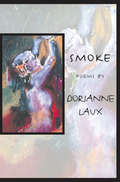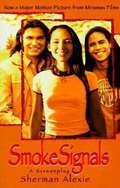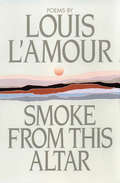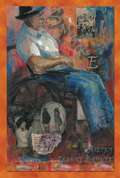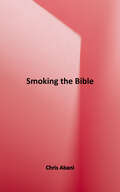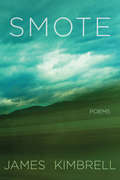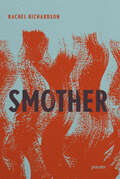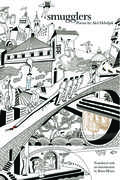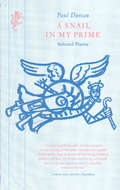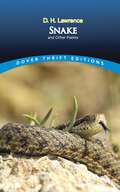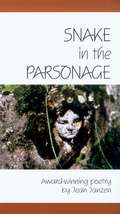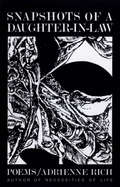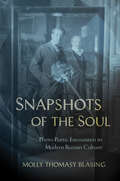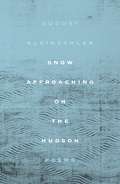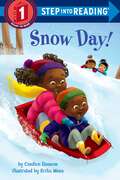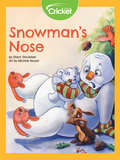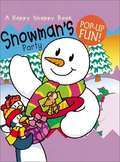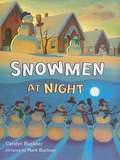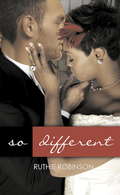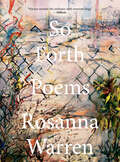- Table View
- List View
Smoke
by Dorianne LauxDorianne Laux's long-awaited third book of poetry follows her collection, What We Carry, a finalist for the 1994 National Book Critics Circle Award for Poetry. In Smoke, Laux revisits familiar themes of family, working class lives and the pleasures of the body in poetry that is vital and artfully crafted-poetry that "gets hard in the face of aloofness," in the words of one reviewer. In Smoke, as in her previous work, Laux weaves the warp and woof of ordinary lives into extraordinary and complex tapestries. In "The Shipfitter's Wife," a woman recalls her husband's homecoming at the end of his work day:Then I'd open his clothes and takethe whole day inside me-the ship'sgray sides, the miles of copper pipe,the voice of the foreman clangingoff the hull's silver ribs. Spark of leadkissing metal. The clamp, the winch,the white fire of the torch, the whistle,and the long drive home.And in the title poem, Laux muses on her own guilty pleasures:Who would want to give it up, the coala cat's eye in the dark room, no one therebut you and your smoke, the windowcracked to street sounds, the distant criesof living things. Alone, you are almostsafe . . .With her keen ear and attentive eye, Dorianne Laux offers us a universe with which we are familiar, but gives it to us fresh.Dorianne Laux is the author of two previous collections of poetry from BOA Editions, Ltd., and is co-author, with Kim Addonizio, of The Poet's Companion: A Guide to the Joys of Writing Poetry (W.W. Norton, 1997), chosen as an alternate selection by several bookclubs. Laux was the judge for the 2012 A. Poulin, Jr. Poetry Contest, and is a tenured professor in the creative writing program at the University of Oregon. Laux lives in Eugene, Oregon.
Smoke (American Poets Continuum #Vol. 62)
by Dorianne LauxDorianne Laux’s long-awaited third book of poetry follows her collection, What We Carry, a finalist for the 1994 National Book Critics Circle Award for Poetry. In Smoke, Laux revisits familiar themes of family, working class lives and the pleasures of the body in poetry that is vital and artfully crafted-poetry that "gets hard in the face of aloofness," in the words of one reviewer. In Smoke, as in her previous work, Laux weaves the warp and woof of ordinary lives into extraordinary and complex tapestries. In "The Shipfitter’s Wife," a woman recalls her husband’s homecoming at the end of his work day:Then I’d open his clothes and takethe whole day inside me-the ship’sgray sides, the miles of copper pipe,the voice of the foreman clangingoff the hull’s silver ribs. Spark of leadkissing metal. The clamp, the winch,the white fire of the torch, the whistle,and the long drive home.And in the title poem, Laux muses on her own guilty pleasures:Who would want to give it up, the coala cat’s eye in the dark room, no one therebut you and your smoke, the windowcracked to street sounds, the distant criesof living things. Alone, you are almostsafe . . .With her keen ear and attentive eye, Dorianne Laux offers us a universe with which we are familiar, but gives it to us fresh.Dorianne Laux is the author of two previous collections of poetry from BOA Editions, Ltd., and is co-author, with Kim Addonizio, of The Poet’s Companion: A Guide to the Joys of Writing Poetry (W.W. Norton, 1997), chosen as an alternate selection by several bookclubs. Laux was the judge for the 2012 A. Poulin, Jr. Poetry Contest, and is a tenured professor in the creative writing program at the University of Oregon. Laux lives in Eugene, Oregon.
Smoke Signals
by Sherman AlexieSet in Arizona, Smoke Signals is the story of two Native American boys on a journey. Victor is the stoic, handsome son of an alcoholic father who has abandoned his family. Thomas is a gregarious, goofy young man who lost both his parents in a fire at a very young age. Through storytelling, Thomas makes every effort to connect with the people around him: Victor, in contrast, uses his quiet countenance to gain strength and confidence. When Victor's estranged father dies, the two men embark on an adventure to Phoenix to collect the ashes. Along the way, Smoke Signals illustrates the ties that bind these two very different young men and embraces the lessons they learn from one another.
Smoke from This Altar
by Louis L'AmourSmoke From This Altar, a book that has become legendary among Louis L'Amour readers, is the very first book L'Amour ever published. It appeared, to great critical praise, for sale only in Oklahoma bookstores more than fifty years ago. Since then it has become the most sought-after L'Amour title of all, with the few circulating copies from the small print run commanding top dollar from rare book collectors. Now, at last, it is being published nationally in this beautiful keepsake Bantam edition.It was in Smoke From This Altar that L'Amour first gave public voice to his now-celebrated spirit of wanderlust. Like the short stories in his classic, million-copy-selling Yondering, and his best-selling memoir Education of a Wandering Man, the poems in this book are inspired by his experiences and memories of his journeys across oceans and continents. It is vintage L'Amour storytelling--in verse--about nature, the land, and the people who loved and braved it.Smoke From This Altar begins with a newly written introduction by his wife Kathy in which she discusses the special place this work has held in the L'Amours' lives. In concludes with twenty previously uncollected L'Amour poems selected by his family.Impassioned, adventurous, heroic, and humorous, Smoke From This Altar is unique L'Amour writing, to be read and enjoyed again and again.From the Hardcover edition.
Smoke: Poems
by Jeanne BrynerThe author intends to create poems that comfort and guide the readers as they face universal fears: sickness, personal and societal abuse, family tragedy, physical pain and emotional longing.
Smoking the Bible
by Chris AbaniSmoking the Bible is an arresting collection of poems thick with feeling, shaped by Chris Abani’s astounding command of form and metaphor. These poems reveal the personal story of two brothers―one elegizing the other―and the larger story of a man in exile: exile of geography, culture, and memory. What we experience in this emotionally generous collection is a deep spiritual reckoning that draws on ancient African traditions of belief, and an intellectual vivacity drawing on various wisdom literatures and traditions. Abani illustrates the connective geography between harm, regret, and release, as poems move through landscapes of Nigeria, the Midwestern United States, adulthood, and childhood. One has the sense of entering a whole and complex world of the imagination in reading this collection. There is no artifice here, no affectation; and these poems are a study in the very grace of image.
Smote
by James Kimbrell"Smote is a book of the dark reality of our daily existence; it is a book of abiding grace."--Robert Olen ButlerI release you like the crank-addled truck driverreleases his cargo at the midnight dockuntil the warehouse is one in a trailof crumbs, little light left on behind him. James Kimbrell is the author of The Gatehouse Heaven and My Psychic, and the co-translator of Three Poets of Modern Korea. He been the recipient of the Discovery/The Nation Award, a Whiting Award, a fellowship from the NEA, and a Morton Prize.
Smother: Poems
by Rachel RichardsonIn this searching, defiant collection, award-winning poet Rachel Richardson takes up the existential losses of climate change and insists on the work of survival. How should we raise our children in, and for, a world that is burning? Rachel Richardson’s third collection, Smother, interrogates this impossible question. The poet, raising young daughters and grieving the death of a mother friend, documents a string of record-breaking fires across the California landscape and the rage, sorrow, and detachment that follow amidst the pervasive smoke. Environmental and physical predation—on the earth and on the female body—weave through the book in layers. But these are not poems of giving up. The poems in Smother gather accomplices in grief and mothering, seek out guides and girlfriends, remember the dead, keep watch at the firebreaks, and plant new trees on the burn scars. From lyric forms to moments of prose and documentary collage, these poems sing their song of resistance made from the music that is available to us now. “Within that vast triangle, land that appears to be hanging only by a flimsy hinge to the continent, the burn scars having leveled the grasses, having pushed the elk elsewhere up the ragged edge for reeds, the hearts of some downed trees still smolder. This is what I go for. To walk inside it, to know what remains of the kingdom.” —from “The Map Is Not The Territory”
Smugglers
by Ales DebeljakThe poems in Smugglers move through rapid historical shifts and meditations on personal experience, exploring the depths and limits of comprehension through the people and geography of the Balkans. Ultimately, Aleš Debeljak's urban imagination creates a mosaic—intimate and historical—of a vanished people and their country. Every poem in Smugglers is sixteen lines long—four quatrains, a common form for Debeljak. This structural regularity is reinforced by a commitment to visual balance, with each poem working as a kind of grid into which the poet pours memories and associative riffs.From "Bookstore":At least you are blessed. Winter's here. In darkness, awakesince yesterday, I came to browse again through the titles of oldbooks, wobbly skyscrapers, writers of my youth and stiffened honey.No opening hours on the door, a minor poet with no womansits behind files in the front. I know him from whenwe all shouted in one loyal voice, collected works on salefor a handful of cents, read the holy Kapitallike zealots. Well, okay: not exactly all. Some of us tookanother road . . .Aleš Debeljak's books have appeared in English, Japanese, German, Croatian, Serbian, Polish, Hungarian, Czech, Spanish, Slovak, Finnish, Lithuanian, and Italian translations. He teaches in the department of Cultural Studies at the University of Ljubljana in Slovenia.Brian Henry is the author of ten books of poetry and won the 2011 Best Translated Book Award. He teaches at University of Virginia in Richmond, Virginia.
Smugglers
by Ales DebeljakThe poems in Smugglers move through rapid historical shifts and meditations on personal experience, exploring the depths and limits of comprehension through the people and geography of the Balkans. Ultimately, Aleš Debeljak's urban imagination creates a mosaic—intimate and historical—of a vanished people and their country. Every poem in Smugglers is sixteen lines long—four quatrains, a common form for Debeljak. This structural regularity is reinforced by a commitment to visual balance, with each poem working as a kind of grid into which the poet pours memories and associative riffs.From "Bookstore":At least you are blessed. Winter's here. In darkness, awakesince yesterday, I came to browse again through the titles of oldbooks, wobbly skyscrapers, writers of my youth and stiffened honey.No opening hours on the door, a minor poet with no womansits behind files in the front. I know him from whenwe all shouted in one loyal voice, collected works on salefor a handful of cents, read the holy Kapitallike zealots. Well, okay: not exactly all. Some of us tookanother road . . .Aleš Debeljak's books have appeared in English, Japanese, German, Croatian, Serbian, Polish, Hungarian, Czech, Spanish, Slovak, Finnish, Lithuanian, and Italian translations. He teaches in the department of Cultural Studies at the University of Ljubljana in Slovenia.Brian Henry is the author of ten books of poetry and won the 2011 Best Translated Book Award. He teaches at University of Virginia in Richmond, Virginia.
Snail In My Prime
by Paul DurcanSince the publication of his first book in 1967, Paul Durcan has made satirical, celebratory and extraordinarily moving poetry out of his country's fortunes and misfortunes. His readings are legendary and each new collection, from his collaboration with Brain Lynch, Endsville (1967) to Daddy, Daddy (winner of the 1990 Whitbread Poetry Award), Crazy about Women (1991) and Greetings to Our Friends in Brazil (1999) has borne out the truth of Ezra Pound's dictum that "literature is news that stays news". This book contains Durcan's own selection from his work. It is a literary milestone that has set the seal on his reputation as a poet of international standing.
Snake and Other Poems (Dover Thrift Editions: Poetry Ser.)
by D. H. Lawrence Bob BlaisdellBest known as the author of Lady Chatterley's Lover and Women In Love, D. H. Lawrence (1885-1930) also wrote some of the twentieth century's finest poetry. Lawrence is noted for his use of words in a richly textured manner that produces vivid images and expresses deep emotion. This ample collection of his verse covers a wide thematic range, including love, marriage, family, class, art, and culture, all treated with extraordinary exuberance, intensity, sensitivity, and occasional humor.These selections originally appeared in Love Poems and Others (1913), Amores (1916), Look! We Have Come Through! (1917), Tortoises (1921), and such periodicals as The Dial and English Review. In addition to the celebrated title poem, individual works include "A Collier's Wife," "Monologue of a Mother," "Quite Forsaken," "Wedlock," "Fireflies in the Corn," "New Heaven and Earth," and many others.
Snake in the Parsonage: Award-winning Poetry
by Jean JanzenSnake in the Parsonage includes the poems for which Jean Janzen received The Creative Writing Fellowship in Poetry from the National Endowment for the Arts. Selected by a panel of major poets. Once again Jean Janzen shows us life -- colored deeply and in irrepressible light. She finds both ecstasy and incompleteness -- while waiting, at the piano and in the halls of the old people's home, lying in the field, shrieking in the cellar, standing at the blackboard.
Snapshots of a Daughter-in-Law: Poems, 1954-1962
by Adrienne Rich"The risk this book quietly takes, and impressively fulfills, is no less than to get life said.... Newly freed from the metrical conventions of her earlier books, Adrienne Rich has lost none of her perfect pitch for the tones of language itself." --Philip Booth, The Christian Science Monitor First published in 1963, this book is now restored to print in a new edition containing some revisions and one hitherto unpublished poem.
Snapshots of the Soul: Photo-Poetic Encounters in Modern Russian Culture
by Molly Thomasy BlasingSnapshots of the Soul considers how photography has shaped Russian poetry from the early twentieth century to the present day. Drawing on theories of the lyric and the elegy, the social history of technology, and little-known archival materials, Molly Thomasy Blasing offers close readings of poems by Boris Pasternak, Marina Tsvetaeva, Joseph Brodsky, and Bella Akhmadulina, as well as by the late and post-Soviet poets Andrei Sen-Sen'kov, Arkadii Dragomoshchenko, and Kirill Medvedev, to understand their fascination with the visual language, representational power, and metaphorical possibilities offered by the camera and the photographic image. Within the context of long-standing anxieties about the threat that visual media pose to literary culture, Blasing finds that these poets were attracted to the affinities and tensions that exist between the lyric or elegy and the snapshot. Snapshots of the Soul reveals that at the core of each poet's approach to "writing the photograph" is the urge to demonstrate the superior ability of poetic language to capture and convey human experience.Open Access edition funded by the National Endowment for the Humanities.
Snow Approaching on the Hudson: Poems
by August KleinzahlerAugust Kleinzahler has earned admiration for his musical, precise, wise, and sometimes madcap poems that are grounded in the wide array of places, people, and most especially voices he has encountered in his real and imaginative worlds. Snow Approaching on the Hudson is a collection that moves seamlessly through the often hypnogogic, porous realms of dreams, the past and present, inner and outer landscapes. His haunting, shifting atmospheres are peopled by characters, intimately portrayed, that are at one historical and invented.The poet's signature rhythmic propulsion serves as the engine for his newest collection, and his always masterful free verse conveys a life thoroughly lived and brilliantly perceived.
Snow Day! (Step into Reading)
by Candice RansomA Step 1 reader to welcome winter, featuring the family from Pumpkin Day! and Apple Picking Day!The brother and sister from PUMPKIN DAY! and APPLE PICKING DAY! have woken up to a winter wonderland--it's a snow day! Read along as they engage in favorite winter activities with their neighborhood friends on their day off from school. Easy-to-follow rhyme ensures a successful reading experience, and bright, fun art enhances the story.Step 1 Readers feature big type and easy words. Rhymes and rhythmic text paired with picture clues help children decode the story. For children who know the alphabet and are eager to begin reading.
Snowman - Cold = Puddle: Spring Equations
by Laura Purdie SalasPoetry + Math + Science = A new way of looking at springMath meets metaphor in this eye-opening exploration of spring. Each clever equation is a tiny, perfect poem that prompts readers to look at the ordinary and see the miraculous. Can you look at an egg in a nest and see a jewelry box? How are sunlight and heat like an alarm clock? Engaging sidebars reveal the science behind the signs of spring.
Snowman's Nose
by Sherri StockdaleRabbit accidentally eats Snowman’s carrot nose while he is napping! To make up for it, Rabbit knows he must find a new nose for Snowman. He finds lots of vegetables in the snow, but will any of them be a good fit for Snowman’s nose?
Snowman's Party
by Templar Company PlcEvery year it's the same...Snowman throws a Christmas bash, everyone comes, and everyone gets gifts. The only thing that's different this year is that you're invited! Come join the fun and see who gets what...including you...at Snowman's party.
Snowmen at Night
by Caralyn Buehner Mark BuehnerHave you ever built a snowman and discovered the next day that his grin has gotten a little crooked, or his tree-branch arms have moved? And you've wondered . . . what do snowmen do at night? This delightful wintertime tale reveals all! Caralyn Buehner's witty, imaginative verse offers many amusing details about the secret life of snowmen and where they go at night, while Mark Buehner's roly-poly snowmen are bursting with personality and charm. From the highly successful team that created such winning titles as Fanny's Dream, Snowmen at Night is fabulous, frosty, and fun!
Snuggle Puppy!: A Love Song
by Sandra BoyntonA great big hug in book form, Snuggle Puppy is a year-round valentine from parent to child. It is bright, chunky, a pleasure to hold, and has a die-cut cover that reveals a glimpse of the joy inside before it's even opened. Best of all, it's packed, of course, with pure Boynton: her inimitable language, her inimitable illustrations, her inimitable sense of fun. OOO, Snuggle Puppy of mine! Everything about you is especially fine. I love what you are. I love what you do. Fuzzy little Snuggle Puppy, I love you. Featuring a sweet and cuddly doggie cast and rhyming verse, Snuggle Puppy is the perfect bedtime book to read last, because of an ending that kids will want again and again: I started with OOO. Now we'll end like this: [BIG SMOOCH!]
So Forth: Poems
by Joseph BrodskyA collection of poems in English by Russian poet, while in exile in the United States. Many exhibit his newly Americanized tongue and some revel in the mysterious accents that characterized his Russian works.
So Forth: Poems
by Rosanna WarrenA lyrical new volume from a poet “beyond the achievement of all but a double handful of living American poets” (Harold Bloom). With irony, in mourning tinged with eros, one of our most extraordinary poets blends the personal and the political to meditate on damage, aging, and injustice. The poems in So Forth surge back in memory, pondering guilt and forgiveness. Consciousness flows from singular to plural; identity in these poems does a round dance with other personae, with formidable women artists of the past in the powerful sequence “Legende of Good Women,” with pre-Socratic philosophers, and with lovers, children, and strangers?the strangest of whom is the face in the mirror. In response to griefs both historical and contemporary, So Forth contemplates the quest for the holy and traditions of the sacred.
